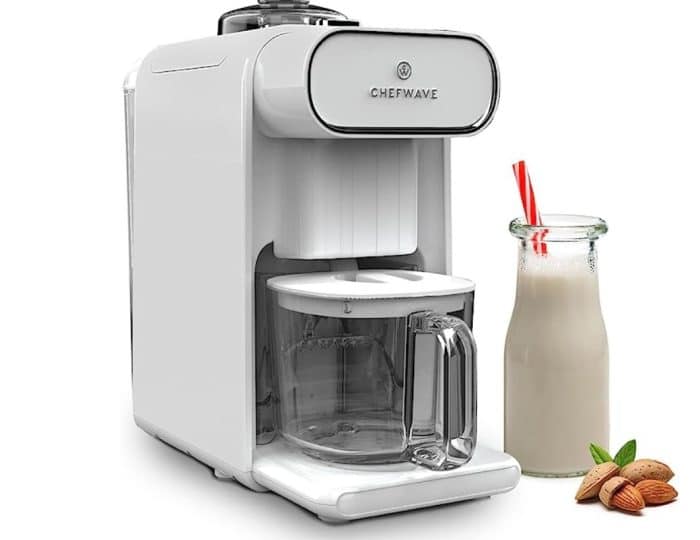32% of Americans now report having either food allergies or food intolerances, regardless of whether they are genuinely intolerant. And 9 of every 10 shoppers who prefer plant-based milk also still consume traditional dairy products like ice cream and cheese.

Today, dairy is a massive and highly regulated industry, valued at over $400B and with a global population of more than 274 million cows. But milk’s appeal is falling. In 1975, the average American consumed around 31 gallons of milk per year, but by 2017, that figure had dropped to just 19 gallons. And in the past decade alone, US milk sales have declined 15%.
It’s partly related to changing meal patterns: America’s breakfast of choice is no longer cereal, a shift that’s caused ripple effects across the milk industry.
Dairy’s decline also runs in parallel to the rise of nut milks. In the late 90’s, a brand named WhiteWave made what seems like a wildly obvious discovery: moving their nut drink product to the refrigerated aisle alongside the dairy milk caused more people to buy it.
Today, there’s a rise in interest for at-home nut milk makers. From a logistics perspective, it’s solid too: 98% of almond milk is water which can, of course, be “shipped” to homes house via plumbing infrastructure so the company can focus on selling concentrated consumables rather than bulky water-laden shipments.
Benefits of using Nut Milk Makers
- Fresh and Customizable Milk: With a nut milk maker, you can create fresh, homemade nut milk whenever you want. The process is quick and easy, allowing you to enjoy the taste and nutritional benefits of freshly made milk. Additionally, you have control over the ingredients, flavors, and sweetness levels, allowing you to customize the milk to suit your preferences.
- Cost Savings: Making your own nut milk with a nut milk maker can be more cost-effective compared to buying store-bought options. Nuts and seeds are generally less expensive than packaged nut milk, and you can make larger quantities at a lower cost per serving. It can also be more economical if you consume plant-based milk regularly.
- Nutritional Value: Homemade nut milk made with a nut milk maker retains more nutrients compared to store-bought options. You can ensure the freshness and quality of the nuts or seeds used, avoiding any additives or preservatives that might be present in commercial products. It also allows you to control the sweetness and avoid added sugars or artificial sweeteners.
- Reduced Waste: By making your own nut milk, you can minimize packaging waste associated with store-bought options. You can use reusable containers for storage, eliminating the need for single-use cartons or bottles.
- Versatility: Nut milk makers often offer the flexibility to experiment with different nuts, seeds, or even grains, expanding the variety of plant-based milks you can make. This allows you to explore flavors and textures beyond the commonly available options.
- Environmental Impact: Making your own nut milk reduces the environmental footprint associated with the production, packaging, and transportation of commercial plant-based milk. By opting for homemade alternatives, you can contribute to reducing greenhouse gas emissions and resource consumption.
- Residue for Other Uses: The leftover nut or seed pulp from the nut milk-making process can be repurposed in various ways. It can be used in baking recipes, added to smoothies or oatmeal, or even used as a base for homemade granola bars. This helps minimize food waste and maximizes the utility of the ingredients.
A nut milk maker is a kitchen appliance designed specifically for making plant-based milk from various nuts and seeds. It simplifies the process of creating homemade nut milk by automating many of the steps involved.
Typically, a nut milk maker consists of a motorized base with a blending mechanism and a filtering system. The user adds soaked nuts or seeds and water to the appliance, which then blends the ingredients together to create a smooth and creamy milk-like consistency. The mixture is then strained through a fine mesh or filter to separate the milk from the solid pulp.
The advantage of using a nut milk maker is that it streamlines the process, making it more convenient and efficient compared to traditional methods such as using a blender and straining through a nut milk bag. Nut milk makers often have preset programs and timers to ensure optimal blending and filtering. Some models may also offer additional features like temperature control or the ability to make other plant-based beverages like almond milk, soy milk, or rice milk.
Overall, nut milk makers provide a convenient and consistent way to make fresh nut milk at home, allowing individuals to customize their milk by adjusting the sweetness, flavor, and consistency to their liking.